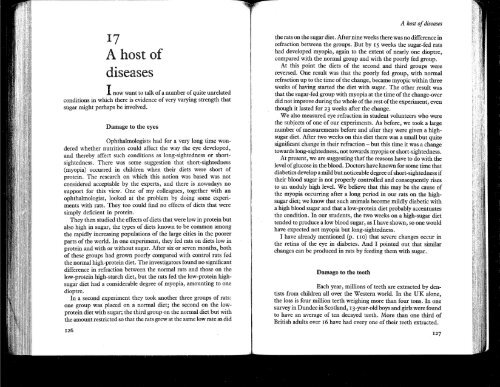John_Yudkin_-_Pure_White_and_Deadly_revised_1986_OCR
John_Yudkin_-_Pure_White_and_Deadly_revised_1986_OCR
John_Yudkin_-_Pure_White_and_Deadly_revised_1986_OCR
You also want an ePaper? Increase the reach of your titles
YUMPU automatically turns print PDFs into web optimized ePapers that Google loves.
17<br />
A host of<br />
diseases<br />
I now want to talk of a number of quite unrelated<br />
conditions in which there is evidence of very varying strength that<br />
sugar might perhaps be involved.<br />
Damage to the eyes<br />
Ophthalmologists had for a very long time wondered<br />
whether nutrition could affect the way the eye developed,<br />
<strong>and</strong> thereby affect such conditions as long-sightedness or shortsightedness.<br />
There was some suggestion that short-sightedness<br />
(myopia) occurred in children when their diets were short of<br />
protein. The research on which this notion was based was not<br />
considered acceptable by the experts, <strong>and</strong> there is nowadays no<br />
support for this view. One of my colleagues, ~ogether with ~<br />
ophthalmologist, looked at the problem by domg some expenments<br />
with rats. They too could find no effects of diets that were<br />
simply deficient in protein.<br />
They then studied the effects of diets that were low in protein but<br />
also high in sugar, the types of diets known to be common among<br />
the rapidly increasing popUlations of the large cities in th~ poorer<br />
parts of the world. In one experiment, they fed rats on diets low in<br />
protein <strong>and</strong> with or without sugar. After six or seven months, both<br />
of these groups had grown poorly compared with control rats fed<br />
the normal high-protein diet. The investigators found no significant<br />
difference in refraction between the normal rats <strong>and</strong> those on the<br />
low-protein. high-starch diet, but the rats fed the low-protein highsugar<br />
diet had a considerable degree of myopia, amounting to one<br />
dioptre.<br />
In a second experiment they took another three groups of rats:<br />
one group was placed on a normal diet; the second on the 10wprotein<br />
diet with sugar; the third group on the normal diet but wi?t<br />
the amount restricted so that the rats grew at the same low rate as did<br />
126<br />
A host of diseases<br />
the rats on the sugar diet. After nine weeks there was no difference in<br />
refraction between the groups. But by 15 weeks the sugar-fed rats<br />
had developed myopia, again to the extent of nearly one dioptre,<br />
compared with the normal group <strong>and</strong> with the poorly fed group.<br />
At this point the diets of the second <strong>and</strong> third groups were<br />
reversed. One result was that the poorly fed group, with normal<br />
refraction up to the time of the change, became myopic within three<br />
weeks of having started the diet with sugar. The other result was<br />
that the sugar-fed group with myopia at the time of the change-over<br />
did not improve during the whole of the rest of the experiment, even<br />
though it lasted for 23 weeks after the change.<br />
We also measured eye refraction in student volunteers who were<br />
the subjects of one of our experiments. As before, we took a large<br />
number of measurements before <strong>and</strong> after they were given a highsugar<br />
diet. After two weeks on this diet there was a small but quite<br />
significant change in their refraction - but this time it was a change<br />
towards long-sightedness, not towards myopia or short-sightedness.<br />
At present, we are suggesting thai the reasons have to do with the<br />
level of glucose in the blood. Doctors have known for some time that<br />
diabetics develop a mild but noticeable degree of short-sightedness if<br />
their blood sugar is not properly controlled <strong>and</strong> consequently rises<br />
to an unduly high level. We believe that this may be the cause of<br />
the myopia occurring after a long period in our rats on the highsugar<br />
diet; we know that such animals become mildly diabetic with<br />
a high blood sugar <strong>and</strong> that a low-protein diet probably accentuates<br />
the condition. In our students, the two weeks on a high-sugar diet<br />
tended to produce a low blood sugar, as I have shown, so one would<br />
have expected not myopia but long-sightedness.<br />
I have already mentioned (p. IIo) that severe changes occur in<br />
the retina of the eye in diabetes. And I pointed out that similar<br />
changes can be produced in rats by feeding them with sugar.<br />
Damage to the teeth<br />
Each year, millions of teeth are extracted by dentists<br />
from children all over the Western world. In the UK alone,<br />
the loss is four million teeth weighing more than four tons. In one<br />
survey in Dundee in Scotl<strong>and</strong>, I 3-year-old boys <strong>and</strong> girls were found<br />
to have an average of ten decayed teeth. More than one third of<br />
British adults over 16 have had everyone of their teeth extracted.<br />
127



